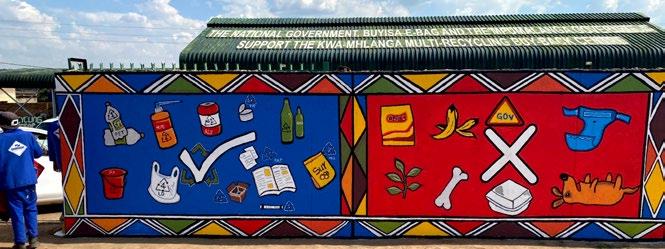
2 minute read
Using art and song to help tackle South Africa's plastic waste crisis
Seven tonnes of plastic waste has been successfully diverted from the environment thanks to a pioneering new collaboration in South Africa, which aimed to change behaviour through art, song and comedy skits, as well as practical measures.
Researchers from the University of Portsmouth’s Revolution Plastics team and the Department of Agriculture, Rural Development and Environmental Affairs (DARDLEA) partnered with UK-based charity WasteAid to run a pilot study in the Thembisile Hani Local Municipality in Mpumalanga. They combined creative ways to educate people about the dangers of dumping and burning waste with on-the-ground action to increase waste recycling including supporting informal waste collectors and introducing community drop-off points for recyclables.
The pilot study has made promising strides in combatting the problem of plastic waste, with two-thirds of local people reporting a positive change in their environment as a direct result of the project. A survey of local residents showed that arts-based methods – in particular the creation of murals – were significant drivers in the success of the project.
Murals sensitised 86 percent of those who saw them on how to separate waste and changed the attitudes and behaviour of 80 percent of those who saw them. By the end of the project, the amount of waste managed by burning or dumping had fallen by 27.7 percent.
In just three months, the Masibambisane project successfully diverted seven tonnes of plastic waste, the equivalent weight of a large African elephant, from entering the environment. The uncontrolled disposal of plastic waste in the area poses a severe threat to the environment and human health, with waste often burned, contributing to climate change and poor air quality.
Working closely with the local community, WasteAid implemented strategies to enhance plastic-waste collection and boost the revenue for local collector groups. The project focused on both supply-side factors, such as educating households on better waste separation and providing collection bins, and demand-side factors, including training collectors on the types of plastics with value and promoting good business management. Additionally, the project facilitated connections with offtakers committed to purchasing plastic waste regularly from collectors.
Dr Cressida Bowyer, deputy director of Revolution Plastics at the University of Portsmouth, said: “Sensitisation is a vital process for educating communities, raising awareness and inspiring behaviour change. To make messaging more effective, it’s important for the message creators to reside in the target community, understand local social and cultural contexts, and actively participate in the production of campaign materials”.










